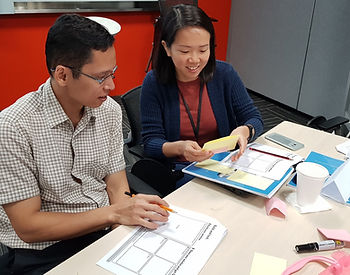
HUMAN-CENTERED SYSTEMS THINKING workshop
Design with empathy. Think in systems. Innovate with impact.
Description
Building on the creative problem-solving foundation of Design Thinking, Human-Centered Systems Thinking (HCST) takes innovation to the next level by integrating empathy with the analytical rigor of Systems Thinking.
As part of our Design Thinking Framework, this advanced course equips participants to address complex, interconnected challenges by combining user-centered insights with system-wide analysis. You will learn to uncover root causes, map dynamic interconnections, and design solutions that are not only desirable but also sustainable and scalable.
Recognized by the World Economic Forum’s Future of Jobs Report 2025 as a critical leadership capability, HCST prepares professionals to lead transformative change with impact and resilience.




Recommended Audience
This advanced program is designed for professionals who have prior exposure to Design Thinking and wish to deepen their problem-solving capability. It is ideal for:
-
Business leaders and managers driving strategic transformation
-
Innovation and design professionals seeking to handle complex systems
-
Change agents, consultants, and facilitators embedding sustainability and scalability in solutions
-
Anyone responsible for navigating multi-stakeholder challenges where simple fixes are insufficient
Methodology
This is an experiential workshop emphasizing active participation and practical application. Participants will engage in:
-
Interactive lectures introducing key concepts and frameworks.
-
Hands-on activities to practice HCST tools and techniques.
-
Group discussions to reflect on insights and share experiences.
-
Real-world case studies to contextualize learning.
-
Collaborative projects to apply HCST methods to participants' own challenges.
Learning Objectives
By the end of this course, participants will be able to:
-
Apply human-centered and systems approaches to solve complex challenges
-
Map interdependencies and identify root causes beyond surface-level problems
-
Design holistic, sustainable, and scalable solutions
-
Strengthen leadership capability in managing dynamic and uncertain environments
-
Extend Design Thinking into a systems-aware innovation practice
Workshop Outline
Session 1: Foundations & Human Empathy
-
Introduction to Human-Centered Systems Thinking (HCST)
-
Why combine empathy with systems awareness to address complex challenges
-
HCST 5-Phase Framework: Empathy → Define → System Analysis → Ideate → Prototype & Test
-
The role of divergent and convergent thinking in innovation
-
Group Activity 1: Challenge Framing through Empathy - Participants identify a real-world challenge they face and explore it through user interviews, personas, or empathy maps. Focus on surfacing emotional and experiential insights.
Session 2: Define & Systems Thinking Tools
-
Crafting clear Problem Statements (POV) and HMW (How Might We) questions
-
Introducing the Iceberg Model and mental models
-
Exploring interconnections and causality using systems thinking
-
Group Activity 2: Iceberg & Leverage Point Analysis - Participants apply the Iceberg Model to identify deeper patterns, structures, and beliefs driving surface challenges. Then pinpoint potential leverage points for intervention.
Session 3: System Mapping & Ideation
-
Visualizing systems through stakeholder maps and causal loops
-
Principles of divergent and convergent ideation
-
Creative ideation techniques aligned with systems awareness
-
Group Activity 3: System Mapping & Idea Generation - Groups build a Systems Map of their selected issue and then brainstorm multiple ideas that address both user needs and systemic leverage points. Narrow down ideas using simple criteria.
Session 4: Prototyping & Design Briefs
-
Prototyping: rapid, low-fidelity ways to test ideas
-
Testing with users and feedback loops
-
Creating a design brief to summarize insights and guide action
-
Group Activity 4: HCST Design Brief Creation - Teams synthesize their work into a clear HCST Design Brief, capturing user feedback, system insights, proposed solutions, and how they will prototype and test their idea.
Wrap-Up & Reflections
Award of Certificate
Certificate of Attendance will be issued to participants who have attended at least 75% of the workshop
Duration
One-day and two-day programs are available
